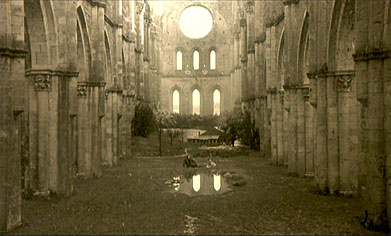Mila From Mars (Mila ot Mars)
One noteworthy film of the nine in competition at the 18th Panorama of European Cinema in Athens was
Mila from Mars (Mila ot Mars), a Bulgarian film shot on hand-held digital, looking almost Dogme in its visual approach. In truth it stopped a little short of this and in places there were static shots and non-diegetic music, with a quite pulsating contemporary soundtrack. More interesting here is that first time director, Zornitsa-Sophia, has a background in theatre, and apparently many of the actors in the film are from her theatre troupe. There is certainly an impression of time being spent working on the characterisations of the main protagonists in the film. In fact, this production could easily have been shot on 35mm, and perhaps this would have been the case if it wasn’t the director’s first film.
Mila from Mars actually reminded me somewhat of the Czech film
Girlie(
Devcátko, 2002) which I first saw in Bratislava in the same year. That film was about a 16-year-old with a similar unstable background who tries only to do well against difficult odds. In fact there is something of a connecting thread running through from the more commercial
Amelie (2001) to
Mila from Mars. However, if
Amelie is the cosier nice fantasy film akin to escapist cinema, then it’s slowly gone to the other extreme here.
Girlie was quite cute but ultimately bleak against a backdrop of brave optimism. This film is bleaker still but also concerns an adolescent girl who hasn’t been given a proper start in life – an innocent girl done wrong for the fact that she is in an orphanage. The authorities admit that her birthday was a sham (it was made up), she becomes pregnant to a man who helps her to escape, but then he beats her, and she is pregnant to him. She flees from him also, but the village she hides in and meets a new boyfriend (who also has violent tendencies) is a place where the local population grows marijuana and her ex is the drug lord. We don’t find out the circumstances in which her parents died but they are not here for her. Even though she was an innocent at heart, she has lived in the darker side of life and hasn’t been able to escape from that until now, but she’s on the run.
In traumatic situations she seems to hold her own (despite one disturbing scene where she attempts to abort her baby). However, at no point do we lose our allegiance because we empathise with her bleak situation, and don’t form any kind of resentment. We realise that every act she commits is a consequence of what has happened, and come to root for her even more in that she’s basically had the strength to rise above it. She could possibly be accused of running away from everything but it’s not quite like that as her whole life has been one of planning an escape route. Very much a clashing of cultures – think of the very primitive Bulgarian border community (albeit, not as ‘naïve’ as they seem) and the entrance of the young ‘punk’ girl and a very brutally techno soundtrack.
A Bulgarian journalist at the Panorama of European Cinema festival told me that it is a strange film from her country, untypical of most Bulgarian films. Therefore, it would be interesting to know what Bulgarians audiences thought of it. I don’t personally see that many Bulgarian films so it’s difficult to compare and contrast, and to see what the cinema is like there, if it’s forward-looking, contemporary or traditional. Even if this film is a break from the norm, it is in that sense alone very worthwhile. A very commendable first film from director Zornitsa-Sophia, who has since made a documentary called
Death and All the Way Back.
Mila from Mars (Mila ot Mars), Bulgaria, 2004
Directed by Zornitsa Sophia
Cast List: Vesela Kazakova, Assen Blatechki, Zlatina Todeva, Yordan Bikov, Lyubomir Popov.
Running time: 91 mins
Related Links
Senses of Cinema article:
http://www.sensesofcinema.com/contents/festivals/05/34/thessaloniki2004.htmlIMDB Address:
http://www.imdb.com/title/tt0416032/




